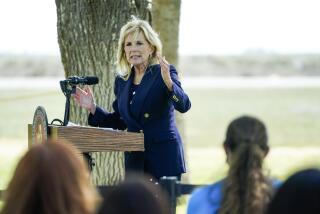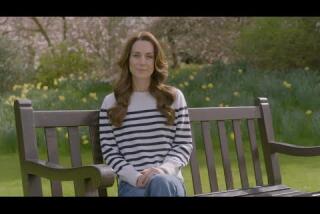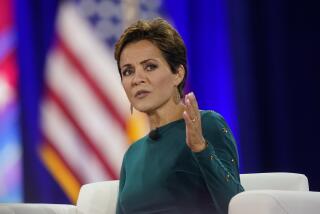Her cancer, his campaign: Edwards and wife carry on
CHAPEL HILL, N.C. -- John Edwards on Thursday stood beside his wife, Elizabeth, at the site of their wedding reception 30 years ago and said some of the most painful words a human being can utter: “Her cancer is back.”
With that, the 2008 presidential campaign entered uncharted territory: A leading candidate will continue to live the public life of trying to win the White House while enduring the personal ordeal of watching his wife battle a deadly disease.
Thursday’s announcement, at an inn near the campus where the couple met as law students, provided a glimpse of complex emotions while sparking a national debate over whether the couple should focus their energy on fighting the disease or remain in a grueling, around-the-clock campaign that can exhaust even the healthiest participants.
The Edwardses -- who were upbeat during their news conference but choked up at points -- surprised many people when they announced that his campaign for the Democratic presidential nomination was not over.
“It goes on strongly,” the former senator from North Carolina said. “From our perspective, other than sitting around feeling sorry for ourselves, there was no reason to stop.”
The couple tried to strike an optimistic tone, even while revealing that Elizabeth Edwards’ cancer -- first diagnosed in 2004 -- had spread from the breast into her bone, indicating that it was no longer curable. “Elizabeth will have this as long as she is alive,” John Edwards said.
But, he said, the illness is treatable. “And many patients in similar circumstances have lived many years undergoing treatment,” he said.
Many in the political world -- and in the large community of people whose lives have been touched by cancer -- responded with an outpouring of emotion.
Laura Farmer, a breast cancer survivor, said she wept while watching the televised news conference from her office in San Diego. “She’s a role model for coping,” said Farmer, a spokeswoman for Susan G. Komen for the Cure, a breast cancer foundation.
Andrew Sullivan, a conservative political commentator with HIV, wrote on his blog: “What I saw in this press conference was the reality of family values -- not the rhetoric, not the divisiveness, not the politics, just the reality of an actual family dealing with real issues.”
As a practical matter, the announcement guarantees that Edwards’ campaign will receive far more attention in the coming days than it has of late, as he has labored in the shadow of Sens. Hillary Rodham Clinton and Barack Obama.
The campaign sent out an e-mail Thursday afternoon indicating the couple still planned to attend a fundraiser tonight in Los Angeles. The candidate also was expected to stick to plans to attend two fundraisers Monday in the San Francisco Bay Area.
But the long-term political implications are uncertain. His wife’s illness may engender sympathy and add an element of human interest to Edwards’ campaign. But there is a risk: Some voters may regard his presidential bid as a misplaced priority, especially if his wife’s condition deteriorates.
Democratic pollster Peter Hart said Edwards would have to strike a “delicate balance ... between a loving husband and an ambitious politician.”
What’s more, Edwards’ campaign will be colored by the progress of his wife’s disease. Having promised Thursday to be with her “anytime, anyplace” that she needs him, Edwards may have to make long detours home from the campaign trail.
Rep. Lois Capps (D-Santa Barbara), whose daughter died of lung cancer seven years ago, said she was surprised to hear Edwards say he would continue to campaign. But she likened his decision to her own decision to pour herself into legislative work after her daughter’s death.
“You retreat or get going with renewed vigor,” Capps said. “I decided to roll up my sleeves.”
Though Edwards is not the first politician to cope with a loved one’s grave illness, Thursday’s announcement marked novel territory for presidential candidates, who already put severe strains on family life -- and on their own health -- by deciding to run.
One Edwards strategist, Dave “Mudcat” Saunders, said the couple’s news motivated him to work harder. “Suddenly I went from 80 miles per hour to 200 miles per hour,” Saunders said.
Saunders said Elizabeth Edwards was probably a driving force behind her husband’s decision to remain in the race. “I know Elizabeth well enough to know that the last thing she would ever want is for John Edwards to step out of a race for her,” he said.
The couple’s news conference, televised from the grounds of an inn near the University of North Carolina, provided voters with a fresh glimpse of a close political couple who already had suffered a well-publicized family tragedy. In 1996, the couple’s teenage son, Wade, died in a car accident.
Elizabeth, a former lawyer, is widely considered a great asset to Edwards’ campaign. A close advisor, she is engaging -- and can be sharp-tongued and irreverent in interviews. She recently published a book, “Saving Graces,” about coping with her son’s death and her earlier bout with cancer -- a sign that the couple would talk openly about the disease during the campaign.
“Almost anything that puts the focus, any sort of focus, on Mrs. Edwards or raises the profile of Mrs. Edwards can only help the campaign, because she’s just fantastic,” said Gordon Fischer, former chairman of the Democratic Party in Iowa, a key early-voting state where Edwards seems to be the front-runner. Fischer described her as “down-to-earth, smart, funny.”
Elizabeth Edwards found a breast lump during the final days of the 2004 presidential campaign, and was diagnosed with cancer two days after the election. She had several months of radiation and chemotherapy.
The couple said the spread of the cancer was discovered Wednesday, two days after she injured her back while lifting a heavy chest and a day after she broke her rib, apparently while her husband was hugging her. They said X-rays, biopsies and other tests confirmed a broken rib, and that the breast cancer had metastasized, or spread.
The Edwardses seemed upbeat and relaxed for a couple confronting a life-threatening disease that has ravaged the lives of millions of sufferers and their families.
Tanned and smiling, they stood side by side in the inn’s manicured garden. They wore wireless microphones, avoiding the need for a more formal lectern, to address the bank of cameras and reporters that descended on the college town.
“As you can see, I don’t look sickly; I don’t feel sickly,” Elizabeth said, spreading her arms.
John Edwards said his wife would continue campaigning with him. But he added that he would drop everything and rush to her side, “no matter what’s happening in the campaign,” if she needed him back home in Chapel Hill.
Reaction to the news underscored the fact that disease knows no party lines. White House Press Secretary Tony Snow, who had surgery in 2005 for colon cancer, praised Elizabeth Edwards for “setting a powerful example.” Rudolph W. Giuliani, the GOP presidential candidate who survived prostate cancer, offered support.
“It is a very, very difficult thing, a very difficult burden, very frightening for anybody, no matter who you are,” Giuliani said.
Many Democrats were reluctant to discuss the political implications of the development, regarding it as unseemly.
Edwards himself used the crisis to talk of the traits that he thinks would make him a strong president. Asked whether his wife’s cancer would weaken his focus, he replied: “Anyone who wants to be president of the United States needs to understand and recognize that there will be very difficult and high-pressure times when judgments have to be made.... I think we’ve demonstrated how to deal with it.”
Farmer of San Diego, herself a breast cancer survivor, agreed that the trauma of coping with cancer in a loved one could add to Edwards’ appeal. “The experience creates a much more deep and sensitive individual,” she said. “What a wonderful representative for the rest of us.”
But Don Sipple, a Republican political strategist, warned that a protracted health struggle would put new strains on Edwards’ candidacy.
“There will be a tremendous amount of empathy for both of them, but I think that will give way to cold reality,” Sipple said. “He may have a difficult time being away from home as much as is required.
“Second, the political marketplace may conclude that he may not be viable because of the distraction.”
janet.hook@latimes.com
peter.wallsten@latimes.com
david.zucchino@latimes.com
Hook and Wallsten reported from Washington and Zucchino from Chapel Hill. Times staff writers Mark Z. Barabak and Dan Morain in California and Michael Finnegan in Washington contributed to this report.
More to Read
Start your day right
Sign up for Essential California for news, features and recommendations from the L.A. Times and beyond in your inbox six days a week.
You may occasionally receive promotional content from the Los Angeles Times.








